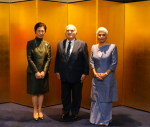You are here
The improbable reformers
Jun 16,2016 - Last updated at Jun 16,2016
Over the last few years, Pope Francis has reinvigorated the Catholic Church’s core message with passionate criticism of unbridled capitalism and a new, more progressive worldview.
In the United States primaries, Vermont Senator Bernie Sanders’ presidential campaign is doing much the same for the Democratic Party — and for US politics more broadly.
Sanders’ message borrows substantially from the Occupy Wall Street (OWS) movement and its call to arms against economic inequality.
But even before Sanders emerged as a contender for the Democratic nomination, Francis won the hearts of millions with a similar message.
Francis has denounced the “widening gap between those who have more and those who must be content with the crumbs”.
His vision of “a church that is poor and for the poor” has earned him the moniker the “People’s Pope”.
It should, therefore, not be surprising that last year, he invited the author and OWS activist Naomi Klein to attend a conference on the environment that he was hosting in Rome.
This year, Sanders addressed the same gathering, arguing that climate change is the most serious security threat facing the world.
His long-held beliefs on the topic mirror those of Francis, who, in a groundbreaking encyclical, aligned himself with the scientific community on climate change.
Both Sanders and Francis link environmental degradation to unbridled capitalism, emphasising that the world’s poorest suffer disproportionately from the environmental impact of activities that often enrich the world’s wealthiest.
Even on topics relating to love and family, Francis is more progressive than his predecessors.
Though church doctrine still holds that marriage is a union between a man and a woman that cannot be broken, his language of tolerance towards homosexuals and the divorced is earthshaking, if not quite groundbreaking.
There is another interesting commonality between Sanders and Francis: both are well into their eighth decade.
At first glance, it seems odd that these pensionable men are among the leading figures echoing and inspiring the young in seeking revolutionary change. Yet, on reflection, the connection is not surprising. After all, when it comes to indignation about the world’s injustices, the old can be just as passionate as the young.
The impact of Sanders and Francis on young people is intensified by the sense that, for both men, truth and morality matter more than self-importance or enrichment.
They both appear modest — Francis has rejected his predecessors’ monarchical lifestyle, and Sanders’ estimated net worth is significantly below average for a US senator — and, for all their progressiveness, thoroughly un-modern.
Moreover, Sanders and Francis are relative outsiders.
Sanders may have a long career in US politics, but he represents the small liberal state of Vermont, and he passionately denounces the big money that is most politicians’ lifeblood.
For his part, Francis is the first Pope from Latin America, and the first to condemn economic inequality with such intensity.
Of course, Francis is not the first Pope to address the topic. In fact, this year’s papal conference celebrated the 15th anniversary of an encyclical by Pope John Paul II about the ethical pitfalls of the market economy and globalisation.
But John Paul II, originally from Soviet-bloc Poland, also staunchly opposed communism; indeed, he played an important role in bringing about that system’s downfall in Central and Eastern Europe.
While neither Francis nor Sanders is advocating communism, both seek to revive, to varying extents, communism’s original aspiration to create a brotherhood among all people.
Mikhail Gorbachev — another revolutionary of humanity and decency — had a similar aspiration in the 1980s.
Interestingly, he took inspiration from John Paul II’s argument that people are not free unless they determine their system of government and help create their own laws, and tried to advance democratisation within the rigid Soviet system.
By bringing a message of justice to communism’s victims, Gorbachev firmly believed that he could reinvigorate the Soviet Union’s dying ideology.
And, for a moment, he did. When the Gorbachev-led 19th National Communist Party Congress was broadcast on television in 1988, the country breathlessly watched its young leader publicly debate his reform ideas, most notably with Andrei Sakharov, a famed nuclear physicist and dissident human rights activist.
Ultimately, of course, the Soviet Union’s ossified structure could not be saved; but, thanks in large part to Gorbachev’s fundamental decency, the USSR’s demise in 1991 was rather peaceful.
He created an environment in which demands for radical change led to compromise, not rage — in sharp contrast to, say, the violent break-up of Yugoslavia.
Like Francis and Sanders, Gorbachev was an improbable reformer.
Despite rising to power with the support of the KGB, he did not surrender his thought processes to that machine, in the way that President Vladimir Putin clearly has.
Likewise, far from fitting the mould of the Democratic machine, Sanders is working to pull the party back “to the social democratic left where it belongs”.
And many in the Vatican today cannot fathom Francis’ approach, viewing his messages of mercy as a “watering down” of the Catholic doctrine.
The opponents of Sanders and Francis may not be old, but they represent the old, while the improbable reformers, though elderly, are speaking for the young.
In August 1991, an attempted coup against Gorbachev failed because he had the support of young people, both on the streets of Moscow and other cities and in the tanks and junior officer corps of the Soviet Union.
That is the power of young people — a power that Sanders has tapped.
Should Hillary Clinton beat him for the Democratic nomination, as seems likely, she will ignore it at her peril.
The writer is professor of international affairs and associate dean for academic affairs at The New School and a senior fellow at the World Policy Institute. ©Project Syndicate, 2016. www.project-syndicate.org












